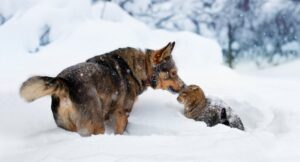How to keep your pets safe in cold weather

Watch out for salt and grit on paws!
When you get back in from a walk with your dog, or when your outdoor cat comes in from the cold, we recommend wiping their paws with lukewarm water. Don’t use hot water as this can be painful for cold paws.
Salt and grit from the roads can cause irritation and injury to sensitive paw pads. Rock salt can also be toxic to dogs and cats even in small doses so it’s best to clean their paws before they lick them clean themselves!
Some dogs find it stressful to have their feet handled. If this is your dog, you can clean the salt from their paw pads by laying down a damp tile and having them walk over it.
Carefully remove clumps of snow from paws and fur
When walking your dog in snowy weather, clumps of snow can stick to their long fur. Try to soak these clumps off with warm water on a sponge rather than pulling them off as this can be painful for your fluffy pet.
If your dog often gets snowy clumps in between their paw pads, you might want to consider trimming the fur on their paws to prevent this from happening so much. You might even want to try dressing them in boots with plenty of grip to avoid the issue completely – if they’ll let you!
Anti-freeze poisoning
It’s important to be aware that antifreeze which contains ethylene glycol is fatally poisonous to cats and dogs. Antifreeze is commonly used in car radiators or on frozen windscreens at this time of year and can cause serious health problems for your dog or cat if ingested.
Anti-freeze poisoning is particularly common in cats as the ‘sweet’ taste of ethylene glycol means they won’t avoid it as they do with other poisonous substances that taste unpleasant. The RSPCA have further advice on the signs of anti-freeze poisoning in cats.
Avoid problems by using non-toxic options with propylene glycol in your own car, clean up spillages quickly, and keep any containers tightly sealed and out of reach of pets.
Animals can ingest antifreeze by walking through puddles and licking it off their paws or fur. If you think your pet has ingested antifreeze, call your vet immediately.

Does my dog need a coat?
There is no cut and dry response to this question. Some breeds, such as greyhounds who have short-haired coats, or cockerpoos whose fur tends to soak up water, can benefit from wearing a coat to stay warm and dry. Other breeds are perfectly comfortable without one.
If you’re not sure whether your dog should wear a coat, keep an eye on them when you’re outside together. If you see them shivering, whining, or displaying other signs of cold such as a hunched posture or tucked tail, then consider trying a dog coat.
We would also advise taking your dog out for shorter walks more regularly to avoid spending long periods of time out in the cold.
How to care for outdoor cats in cold weather
Even the most adventurous outdoor cat would likely prefer to curl up inside when the weather is freezing outside, but if your feline friend insists on getting outdoors, here are some tips to keep them safe.
Firstly, ensure they always have access back indoors, make sure that cat flaps aren’t blocked by snow or ice. Check garden sheds or garages as they may try to curl up where it’s dry and be careful to check car engines for any furry stowaways who might have been attracted to the heat of the engine.
As much as you can, encourage them to stay indoors during extreme weather, especially overnight. Offer them plenty of warm blankets and cosy dens and provide extra litter trays for outdoor cats who aren’t able to go outside as they normally would.
Remember to have fun!
Outdoor cats who have been kept inside, or dogs who haven’t been able to get as many walks as they like will need a little extra attention and stimulation while you all hunker down together.
Take time to play with their favourite toys or why try making them a new one with our DIY toy ideas?
Stay warm and stay safe
If in doubt, keep your pets safe in cold weather by staying indoors and providing plenty of warm spots and stimulation.
If you’re worried about antifreeze poisoning or other medical issues, please call your vet for further advice.